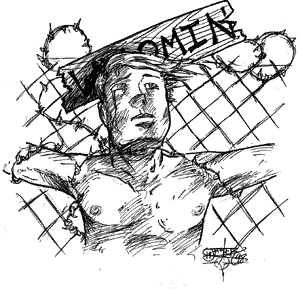

|
|





|
|
|
|
|
|
|
|
|
|
Finish the reawakening
![[Picture]](05_1_i.gif)
Hate crime legislation long left to languish in many states may draw new breath, taken from the stilled lips of a slain gay college student whose brutal death is also sparking candles across the UA Mall tonight. If foes of the legislation do not stifle the national reawakening brought on by Matthew Shepard's death, that is. Because, in part, he was openly gay, Shepard, a University of Wyoming student, was beaten, pistol-whipped and bashed in the head so cruelly physicians could not even salvage his crushed skull. The boy, described as trusting and a talented master of three languages, was lashed to a rail and left to die in a state without a hate crimes law. The murder, heavily tinged with brutal overtones of lynchings of blacks decades ago or the dragging death of James Byrd, Jr. this summer, prompted top officials and newspapers across the country to remind the nation that of the 40 states in the nation with anti-hate legislation, only 19 also protect gays. "Crimes of hate and crimes of violence cannot be tolerated in our country," President Bill Clinton has said in the wake of the murder. "I hope that Congress will pass the hate crime legislation.'' The federal Hate Crimes Act first introduced to Congress in 1997, would add as much as ten years to criminals' sentences if their crime was prompted by the "actual or perceived race, color, religion, or national orientation of any person." It could be amended to protect gays as well. Federalized hate crime legislation would finally define which groups are protected in states with hate crime legislation and bring a powerful and just law to states without the legislation. Happily, Arizona is among the 19 states with comprehensive hate legislation. But in states without such laws, the movement to enact anti-hate legislation is painfully slowed by staunch opposition.
Even now, after the national reawakening brought on by Matthew Shepard's murder, hate crime legislation foes are working to stall hate crime legislation. They argue that additional punishment for criminals motivated by racial or sexual orientation-based hatred is in effect punishing criminals for their thought. For example, one staff editorial published in the Brown University student newspaper and circulated on U-Wire, the student paper equivalent of the Associated Press, argued, "it is not the place of government to decide who we are and aren't allowed to hate. Employing a hateful belief system should not be against the law; acting on those beliefs, however, is another issue." Indeed. But isn't choosing a victim, in effect, discriminating while choosing who to victimize not acting on these beliefs? This is what criminals motivated by hate do - guide their selection of victims by their bias. We have discrimination laws punishing offenders for doing precisely that in hiring situations, in housing situations, when someone is singled out for victimization be-cause of race, gender or sexual orientation. Violent crime - beating murdering or torturing someone for their race, gender or sexual orientation - is just a much more horrific form of discrimination. It ought to be punished. In and of itself, in its own category. That it has not been is a great injustice to all the victims who have been tortured and murdered because of hate, and whose murderers and torturers received less than their full desert. Hate crime laws make sense. They are just intuitively and just under the laws of our land. That they have not been enacted is a testament to the sway the misguided arguments of hate crime foes - who sometimes, in an unfortunate irony, are well-intentioned - have over lawmakers. More frightening, that the laws have not been passed may be testament to the sway America's close-minded past, in which minorities were lynched and brutalized, still has on this ostensibly enlightened nation. The modern gay movement began three decades ago. It is time for all of America to clean itself of the last taint of a blindered and unjust past and pursue justice. In 1976, 21-year-old Richard Heakin was beaten to death outside a Tucson bar for being gay. His death jolted Tucson to become one of the first cities to enact anti-discrimination legislation that covered gays. The nation should take that example and show naysayers the inaccuracy of their objections by swiftly enacting comprehensive anti-hate laws. Help the nation realize that as you take to the Mall tonight for the candlelight vigil. And finish the reawakening Matthew Shepard started. Mary Fan is a molecular and cellular biology and journalism senior and perspectives editor of the Arizona Daily Wildcat. She can be reached via e-mail at Mary.Fan@wildcat.arizona.edu.
|
